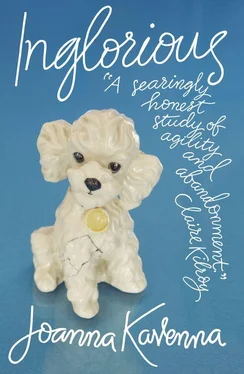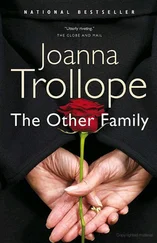This is something you must do now. There was not much time left. The hour was slipping away. She had another course and coffee in which to marshal herself. Could she do it? That was the question hovering over Rosa as she sat there with a fork in her mouth. ‘Good food,’ said her father.
‘I mean, perhaps, that it is only when we are aware of the grounds of fear and hope, only when we really understand the nature of the problem, that we can really judge how to behave,’ said Rosa. Verbiage! Really she was thinking, Go on! Get him to lend you money. He is your father. It won’t kill him. Will it?
‘But that’s too much to ask. You want to understand before you enter into things. That’s quite impossible. You’ll never understand,’ said her father.
‘Yes, yes, I know.’
Her father said quietly, ‘Rosa. I don’t want to put pressure on you to behave in a certain way. Equally I don’t want you to throw your life away. Of course I want you to be happy. But there are sacrifices. Some things we have to do because they are necessary, not because we want to do them. This requires strength of character. You have to arm yourself.’
‘I want you to understand that I have been trying to get a job,’ said Rosa.
‘Somehow your generation got spoilt. We must have been too eager to please.’
HA HA HA HA HA HA HA HA.
‘For once I agree,’ said Rosa.
‘Really?’ said her father.
‘Not with you,’ she said, nodding in the direction of the laughter.
‘There’s no purpose in misanthropy,’ said her father. ‘It’s too easy to feel remote from your kind. You judge them from what they show to you, not from what they are.’
‘How can I find out the difference?’
HA HA HA HA HA HA HA.
‘I’ve always believed in patience,’ said her father. ‘No one is superior to anyone. It’s just circumstances and luck that differentiate between people. You have to understand.’
‘Dessert?’ said the waiter. A slice of tiramisu, to go with your existential crisis? They ordered dessert. Rosa was mentally calculating the cost, wondering if her father knew he was paying. Only one more course to go and how could she supplicate? If she implored him would he help? Just a thousand, nothing more, and by the time that ran out she would certainly have a job. She would take whatever came first, Brazier or whoever else she could persuade to pay her for her time. They were silent, while Rosa struggled with her native spinelessness and her father finished the wine. All she had to do was phrase the question. Still she couldn’t. She was quite chilled by the thought of it.
‘And is there anything else you would like to do?’ said her father.
‘Alchemy? Necromancy? Automatic writing?’
‘No dear, not those.’
‘And Bob said shut up, darling, I’m trying to make a fucking JOKE,’ added a man to her left.
HA HA HA HA HA HA.
HA HA HA HA HA HA.
‘I was on a frigging roller coaster,’ said the man.
‘Dad perhaps I will come and stay with you some time? I won’t come for ever. Just for a few days,’ asked Rosa.
‘Of course, I’d love you to come. You should come soon,’ said her father. ‘Before winter sweeps along the Gorge.’
‘I’d really like to, thanks.’
He wouldn’t be alive much longer, thought Rosa. And lying wouldn’t hurt for a while. It wasn’t fair. He had done enough already. She felt this was true — he had reared her, consoled her, supported her for many years, and he had always been kind. But was this cowardice? She had generally concealed from him her failures and small humiliations. She was his only child; of course she felt he had tried hard and she should strive to repay that. Why trouble him now with the truth? So they took their spoons and ate. Father, she thought. What have you discovered, in your long life? Anything to impart? All my other relatives went quietly to the grave, without spilling any secrets. My mother simply vanished one day, leaving no clues. Do you have anything further to say? She imagined a scene in the future, a few years hence, not long, she thought, looking over at her father’s hollow cheeks, his shrivelled hands. One day she would regret her lack of resolve. So much would go unsaid. It was that sort of family. Why rattle the cage? Her father had waved off his parents without saying anything violent or unpalatable. They just talked in careful phrases, too worried about bruising each other with anything like the truth. Grandfather Don and grandmother Mary had vanished into the dark. Grandfather Don had been dying — he knew it, his wife knew it, his son knew it. Yet none of them mentioned it to the other. They all kept it quiet, fastidiously. The way you should. It drove her wild. Yet it wasn’t her father’s fault. His love for Rosa was so unobtrusive, so unassuming, that it had always made her crave his attention. He had been aloof, hiding in his study, at work on another book he would never finish. He was a master of inconclusive prose. Then he spent hours marking essays, his glasses on his nose. Rosa’s mother was the garrulous one, and she was always talking to Rosa. Her father would spread the newspapers across the breakfast table, brew up a great cylinder of coffee, and pass the morning engrossed, answering Rosa’s questions in terse sentences. ‘The chairman of the Tory party, Rosa. You should know that.’ ‘He’s the Minister for Education, a vicious man.’ ‘That’s the Chief Whip.’ She had only ever really talked to her father about politics and battles. She liked to see him animated — he had a good memory, and he talked of cause and consequence, the origins of the House of Tudor, the Restoration, the World Wars. Always she had been careful when she spoke to him. No wonder she couldn’t ask him for a loan! But it was ridiculous. He had the money. He would be angry that she hadn’t asked. When she was finally taken off to debtor’s jail, there to rot with the shopaholic and the incontinent and plain unlucky, the much unluckier than her, he would tell her she should have asked for help. But she couldn’t anyway, and that was the end of it. She simply couldn’t phrase the words.
Contrite, she said, ‘Delicious dessert. Really good food. This place is better than I remember it,’ because her father was paying and it seemed ungrateful to complain. ‘Nice chocolate sauce. Delicious.’
Her father said: ‘We are meant to be industrious. And our industry should make us happy.’
HA HA HA HA HA HA HA said everyone together. The whole restaurant was laughing. It was only Rosa and her father who were sitting pensively at their small table.
Later Rosa allowed her father to pay for her lunch. He had known all along, and only grumbled briefly. Embarrassed, she said she would buy him lunch next time. They stood outside the door of the restaurant, and he eyed her bags. ‘Off on holiday?’ he said, arching his brows and, Rosa imagined, thinking of the money he had just spent.
‘No, I told you, I have to go to see a friend. Just for a couple of nights. I’ll apply for jobs while I’m away. Then I’ll be back and busy, don’t you worry,’ she said. ‘But, Dad, are you sure you’re OK? I never really asked.’
Her father’s face was pale in the sunlight. But his eyes were still bright blue. He fixed her with them and said:
‘I told you Rosa, my days are very structured. I read a lot. Most importantly, I feel I have improved in some things since September. My Spanish is slightly better, even with my ancient brain. My bridge is much improved. I am fitter, if more deaf.’
He was like a character in Gogol, his jacket almost worn through at the sleeves. He was carrying folded papers in a shabby satchel. Now he was talking about the virtues of planning, about how important it was to plan a life.
Читать дальше












